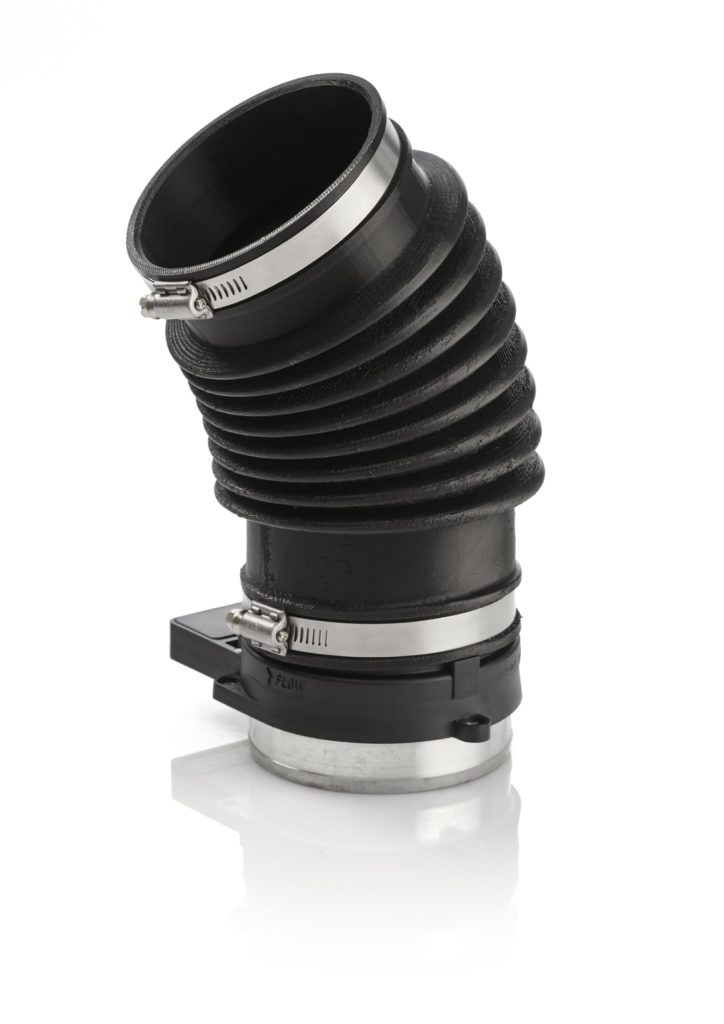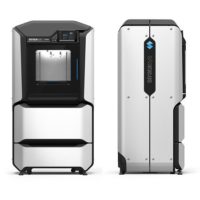Flexibility Meets Durability
Introducing Stratasys FDM TPU 92A - an elastomer 3D printing material engineered for prototyping highly functional, large, durable, complex elastomer parts. Optimized for the Stratasys F123 3D printer series, you can now produce elastomer parts that elongate and compress with an easier workflow. With truly soluble support material you can produce parts that have curves, overhangs, and cavities without having to worry about extensive post-processing, or printing fails. See what's possible with elastomers, get started with a project today.
Overview
Produce Large, Complex Parts
Make accurate elastomer parts rapidly and efficiently with the ease and reliability of professional Fused Deposition Modeling (FDM) 3D printing technology. The strong, reliable elasticity of FDM TPU 92A materials makes it the best choice for a vast range of applications; some of which include hoses, tubes, air ducts and vibration dampeners.

Material Performance
FDM TPU 92A – a thermoplastic polyurethane, combined with flexibility and stretch with abrasion and tear resistance. Using this material to 3D print provides a superior alternative to less optimal TPU 3D printing technologies and reduces both costly and time-consuming molding or casting methods to produce elastomer parts.
TENSILE STRENGTH
16.8 MPa (XY Axis)
17.4 MPa (XZ Axis)
ELONGATION AT BREAK
552% (XY Axis)
482% (XZ Axis)
TEAR STRENGTH
94.6N/mm (XY Axis)
SHORE HARDNESS
92 Scale A
Material Highlights
Characteristics
Prototype highly functional, large, durable elastomer parts
Combines flexibility and stretch
Create accurate elastomer parts quickly
Abrasion and tear resistant
Advantages
Eliminates expensive/time consuming molding/casting methods
Simple workflow
Uses
Seals
Gaskets
Surface protection covers
Mats, liners
Bellows
Wheels, rollers
Ducts
Manufacturing Aids
Hoses, tubes
Industries
Transportation
Consumer goods
Industrial goods
Education
Performance Scale
![]()
![]()
![]()
![]()
Material Colours

Powered By FDM
Build durable and high-quality parts with FDM. Consisting of production-grade thermoplastics, parts 3D printed with FDM are affordable, mechanically strong and stable over time.
Technical Specifications
| Mechanical Properties | Test Method | Value XY Orientation |
XZ Orientation |
| Shore Hardness (molded) | ASTM D2240 | 92 Shore A | 92 Shore A |
| Tensile Strength, Yield (Type 1, 0.125″, 0.2″/min) | ASTM D412 | 15.6 MPa (2,265 psi) |
16.1 MPa (2,332 psi) |
| Tensile Strength, Ultimate (Type 1, 0.125″, 0.2″/min) | ASTM D412 | 16.8 MPa (2,432 psi) |
17.4 MPa (2,519 psi) |
| Tensile Modulus (Type 1, 0.125″, 0.2″/min) | ASTM D412 | 15.3 MPa (2,212 psi) |
20.7 MPa (3,000 psi) |
| Elongation at Break (Type 1, 0.125″, 0.2″/min) | ASTM D412 | 552% | 482% |
| Elongation at Yield (Type 1, 0.125″, 0.2″/min) | ASTM D412 | 466% | 385% |
| Tensile Stress at 100% Elongation (PSI) | ASTM D412 | 6.9 MPa (999 psi) |
7.6 MPa (1,096 psi) |
| Tensile Stress at 300% Elongation (PSI) | ASTM D412 | 11.0 MPa (1,598 psi) |
11.9 MPa (1,722 psi) |
| Flexural Strength (Method 1, 0.05″/min) | ASTM D790 | 1.8 MPa (255 psi) |
2.4 MPa (351 psi) |
| Flexural Modulus (Method 1, 0.05″/min) | ASTM D790 | 25.6 MPa (3,719 psi) |
36.9 MPa (5,349 psi) |
| Flexural Strain at Break (Method 1, 0.05″/min) | ASTM D790 | No break | No break |
| Tear Strength – Stamped | ASTM D624-C | 84.6 N/mm (483 lbF/in) |
NA |
| Compressive Strength, Yield (Method 1, 0.5″/min) | ASTM D695 | 2.6 MPa (384 psi) |
2.6 MPa (384 psi) |
| Compressive Strength, Ultimate (Method 1, 0.05″/min) | ASTM D695 | 2.6 MPa (384 psi) |
2.6 MPa (384 psi) |
| Compressive Modulus (Method 1, 0.05″/min) | ASTM D695 | 16.9 MPa (2,457 psi) |
16.9 MPa (2,457 psi) |
| Compression Set at 22 Hours @ 23 ºC | ASTM D395 | 21% | NA |
| Compression Set at 22 Hours @ 70 ºC | ASTM D395 | 44% | NA |
| Thermal Properties | Test Method | Value |
| Heat Deflecton (HDT) @ 66 psi | ASTM D648 | 38 ºC (100.4 ºF) |
| Heat Deflection (HDT) @ 15 psi) | NA | 56 ºC (132.8 ºF) |
| Vicat Softening Temperature (Rate B/50) | ASTM D1525 | 95 ºC (203 ºF) |
| Glass Transition Temperature (Tg) | DMA (SSYS) | -42 ºC (-43.6 ºF) |
| Coefficient of Thermal Expansion (X-Direction) | ASTM E831 | 139 µm/(m∙ºC) (7.72E-05 in/(in∙ºF)) |
| Coefficient of Thermal Expansion (Y-Direction) | ASTM E831 | 159 µm/(m∙ºC) (8.83E-05 in/(in∙ºF)) |
| Coefficient of Thermal Expansion (Z-Direction) | ASTM E831 | 176 µm/(m∙ºC) (9.78E-05 in/(in∙ºF)) |
| Electrical Properties | Test Method | Value XY Orientation |
XZ Orientation |
| Volume Resistivity | ASTM D257 | 6.09E+ ohm-cm | 7.17E+ 13 ohm-cm |
| Other | Test Method | Value |
| Specific Gravity | ASTM D792 | 1.13502 |
| Flame Classification | UL94 | HB* and V2** |




